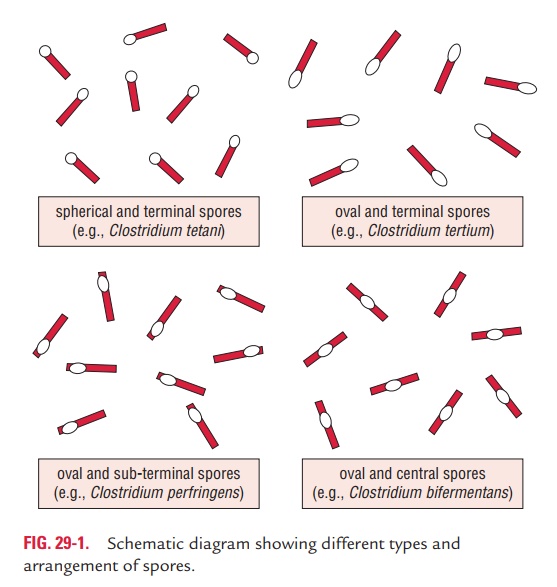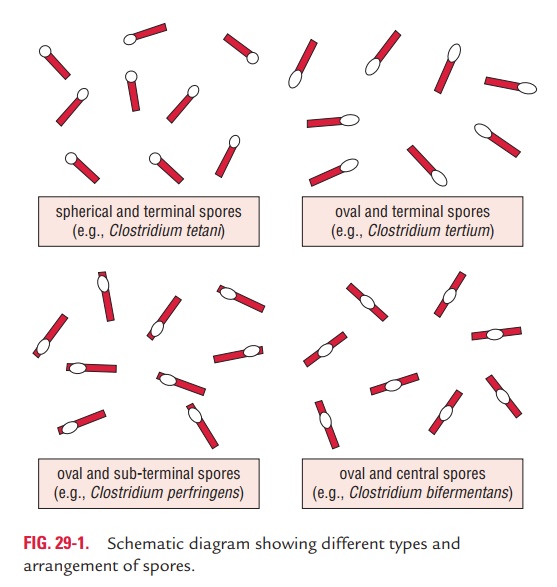Chapter: Microbiology and Immunology: Bacteriology: Clostridium
General Properties of Clostridia

General Properties of Clostridia
Clostridia show following morphological properties:
· Most species are anaerobic but few species such as Clostrid-ium tertium, Clostridium histolyticum, etc. are aerotolerant andhence can grow on agar even in presence of air.
· Clostridia are rod-shaped bacilli measuring 3–8 0.4–1.2 m in size.
· The bacilli are highly pleomorphic and show long filaments and involution forms.
· They are Gram-positive but old cultures may appear Gram-variable and even Gram-negative.
· Most Clostridium species with few exceptions (e.g., Clostridiumperfringens, Clostridium tetani type VI) are motile due to thepresence of peritrichous flagella.
· Most clostridia except C. perfringens and Clostridium butyri-cum are noncapsulated.
· Ability to produce endospores is the most important feature of clostridia.
Spores: Formation of spores is variable depending on the spe-cies. Clostridium sporogenes and other clostridia sporulate readily, while C. perfringens and other species produce spores inconsis-tently. Sporulation takes place outside in the environment and also in animal bodies, but not in humans. The shape and loca-tion of the spores (Fig. 29-1) in the bacteria vary in different clostridial species:
· Central spores:InClostridium bifermentans, giving the bacil-lus a spindle shape.
· Subterminal spores:InC. perfringens, giving the bacillus aclub shape.
· Oval terminal spores:InC. tertium, giving the bacillus a ten-nis racket shape.
· Spherical terminal spores:InC. tetani, giving the bacillus adrumstick appearance.
Spores are relatively more resistant forms than the vegetative forms of the bacilli. They show a variable degree of resistance to heat, drying, and disinfectants. Spores are killed by 1% aque-ous solution of iodine and 2% glutaraldehyde at pH 7.5–8.5. They are particularly resistant to phenolic disinfectants. The spores survive in 2% formaldehyde solution even for up to 5 days. Clostridium botulinum spores survive boiling at 105°C for 3–4 hours, while spores of C. perfringens and C. tetani are rapidly destroyed by boiling for less than 5 minutes. Some strains of C. tetani can resist boiling for 15–90 minutes. C. perfringens typeA strains, however, survive boiling for several hours.

Culture: Most species are anaerobic but few species, such asC. tertium, C. histolyticum, etc., are aerotolerant and hence cangrow on agar even in presence of air. Presence of adequate quantity of low redox potential (Eh) substances in the media is important for the growth of these anaerobic bacteria. Use of reducing substances, such as ascorbic acid, glutathione, unsat-urated fatty acids, cysteine, thioglycolic acid, alkaline glucose, or metallic iron maintain low redox potentials in the medium.
Most clostridia grow at an optimum temperature of 37°C and pH of 7–7.4. Growth on solid media is variable. Some clostridial species produce hemolysis on blood agar. Robertson’s cooked meat (RCM) broth is a useful medium for the growth of clostridia. The medium contains unsatu-rated fatty acids, digested meat, and sulfhydryl compounds. Clostridia grow well in the medium, rendering the broth turbid. Saccharolytic clostridia turn the meat pink, while pro-teolytic species turn the meat black and produce foul smell. Most clostridia produce gas.
Sensitivity to antibiotics: The bacteria are sensitive to met-ronidazole, penicillin, and cephalosporins. They are less sensitive to tetracyclines and resistant to quinolones and aminoglycosides.
Related Topics